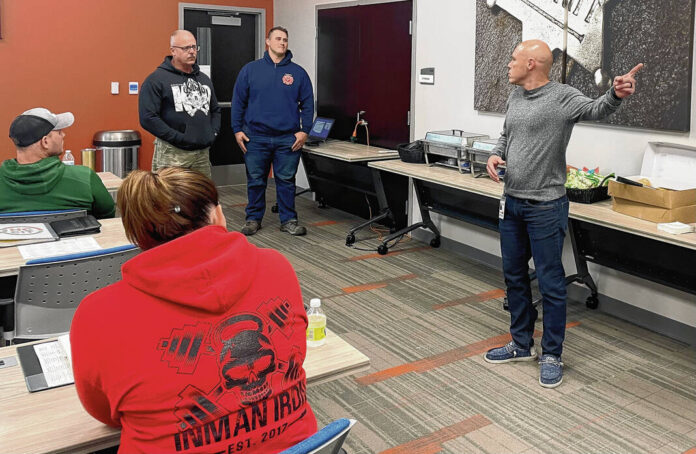
Matthew Graham, right, a mental health specialist with the Hancock County Sheriff’s Department, role plays the part of a man with mental health or addiction issues in a Crisis Intervention Training course held at the county jail this week. Sheriff’s deputy Scott Chapman and paramedic Ben Slawta role played the part of first responders.
HANCOCK COUNTY — When Jon Anderson joined the Greenfield Police Department 20 years ago, mental health issues within the public weren’t really discussed.
He’s glad to see that changing.
Learning how to handle people with mental illness, including addiction, has become the norm among Hancock County law enforcement agencies since a Crisis Intervention Training program was launched in 2018.
Since then nearly every law enforcement officer in the county has gone through the training.
“We’ve worked our way through the majority of departments and we’re down to 10 more Greenfield police officers left to go,” said Anderson, who is now offering refresher classes for those who first completed the course.
Wednesday through Friday this week, he and Robert Harris — a lieutenant and shift supervisor for the Hancock County Sheriff’s Department — led the latest round of training at the Hancock County Jail.
Seventeen law enforcement officers, firefighters, paramedics and social workers from various agencies throughout the county attended the training Sept. 28-30.
The training is a collaborative effort between local police and fire agencies and Healthy365, a division of Hancock Health.

During training this week, class members took turns role playing situations in which they encountered people suffering from addiction or mental illness.
Matthew Graham, who works in the mental health field at the Hancock County Jail, pretended to be a man who had been found wandering outside a local gas station for hours, talking to himself and making the people he encountered anxious.
Class members took turns interacting with Graham, using the tactics they learned earlier in class, like the importance of active listening and effective communication in regards to words used, tone of voice and body language.
Rather than berate the man portrayed by Graham or take him to jail, sheriff’s deputy Scott Chapman and paramedic Ben Slawta role-played how to talk calmly to the man and offer him a soda while trying to assess his situation.
Rookie patrolman Nicole Higham said a lot of this week’s training was reflective of things she recently learned at the police academy and that it was essential steps for all law enforcement officers to learn.
“The training shows you a different way of looking at how to communicate with someone in those situations, and provides you with communication skills and tactics to help. Some of the suggestions they’re giving us are things I hadn’t considered before,” said Higham, who joined the Greenfield Police Department last October.
She said the training has been essential to her first year on the job.
“Mental health issues and addiction are a huge part of our community. I’d say a solid 50 percent of calls I get are from our homeless population, our schizophrenic population,” she said.
She’s thankful today’s first responders are being specially trained in how to better engage and support people with mental health problems, knowing that hasn’t always been the case.
“These aren’t people we can brush under the rug and ignore anymore. They need help and they need attention, and taking them to jail is not a long-term solution,” she said.
Both Anderson and Harris admit that jail time was the go-to protocol when they started out in law enforcement 20 years ago when less was known about addiction and mental health issues and how to deal with them.
“When I first started, we never really talked about mental illness, other than what we can charge them with, so we’d put them in jail and not deal with them for a while,” said Harris.
“Thankfully, now we’re realizing alternative methods that can hopefully keep (those people) out of the criminal justice system, which is not only better for them but can hopefully prevent jail overcrowding and save the taxpayers money,” he said.
Anderson said the knowledge and resources available today far surpass what little was taught about mental health and addiction when he first joined the police force 20 years ago.
“Now rather than just throw them in jail when they’re in crisis, we try to be that sound voice for them, so that we can get them the help that they need,” he said.
“We deal with different disorders like schizophrenia and bipolar disorder, so we learn about what causes those things and how to identify them when we’re out on the road handling calls.”
Slawta, a paramedic for the Greenfield Fire Department and transport medic for Seals Ambulance Services, said the training helps local first responders and social workers work better as a team.
“We’re trained to work together to think about whether someone might be having a medical emergency that’s altering their behavior, or if there’s a mental health or addiction issue we’re dealing with, so we understand what a patient may be experiencing in a traumatic situation,” he said.
“Whether it’s an addict or an autistic child who needs somebody to sit down and talk, it helps me better understand how to help my patients and meet their needs.”
Harris said the training has come at just the right time as mental health and addiction issues continue to rise.
“Now more than ever we’re experiencing more and more calls with people who are in crisis, whether that’s due to substance abuse disorder or other mental health disorders. Anything we can do to help those people and give them a chance to hopefully get the help they need is well worth it,” he said.




